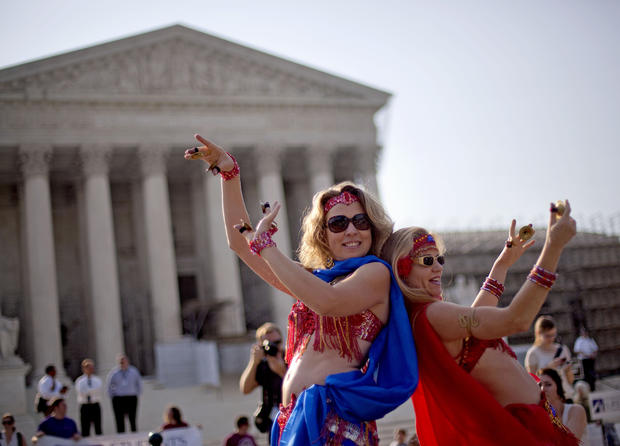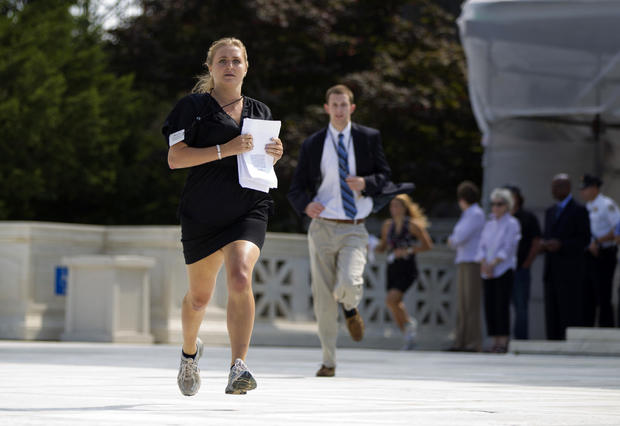Supreme Court ruling: What happened in the courtroom
(CBS News) The weather was already hot and humid at 8:30 a.m. as the drama of today's Supreme Court health care ruling got going. There were belly dancers and pro-life protestors mingling with Tea Party proponents on the Supreme Court steps. At least two dozen camera crews with television correspondents stood just off those steps, ready to go live the moment the court issued its ruling on President Obama's signature achievement so far in his presidency. All of it happened under the watchful eyes of Supreme Court police officers charged with allowing freedom of speech while protecting everyone's safety.
As the protestors got ready for the main event outside, members of the press, after going through security, gathered in a small room reserved for media on the first floor of the court house. Every surface in the room had a journalist prepping for the big ruling. CBS News alone had one little cubicle no larger than three feet wide -- and five people with different roles to play in the room. Two CBS News interns, Jenna Dagenhart and Jordyn Newcome, stood ready in business attire and athletic sneakers to run the court opinions out to correspondents Jan Crawford, Wyatt Andrews and Nancy Cordes the moment they were released.
At 9:30 a.m. Eastern Time, certain journalists with a special orange pass were allowed to walk up the marble steps inside the court house to the second floor where the court room is located. No cell phones. No BlackBerrys. No electronic devices allowed. So with legal pads, pens and, for this journalist, a copy of the Constitution just in case, members of the media went through security one more time before being ushered into the courtroom.
As journalists, and members of the public lucky enough to get into the court to witness a historic day, sat waiting for the session to begin at 10 a.m., the air buzzed with a nervous excitement. Attendees made last-minute predictions and looked for anyone there who might give some kind of clue as to which way the court would rule. Journalists spotted the wives of Associate Justices Anthony Kennedy and Stephen Breyer and wondered if that meant Kennedy would issue the majority opinion.
Complete Coverage: Health Care
Obama, Romney react to health care
Read the Supreme Court's full decision
U.S. Solicitor General Donald Verrilli, who argued the government's case, stood in the front of courtroom and looked completely at ease, chatting and joking around with colleagues. Republican Senators Orrin Hatch (R-Utah), John Barasso (R-Wyo.) and Mike Lee (R-Utah) took seats in the courtroom. Republican Representatives Cathy McMorris Rodgers (R-WA) and Tom Price (R-GA) had been asked by Speaker John Boehner to attend the session and they stood chatting with Tea Party favorite Michele Bachmann (R-MN).
As the clock ticked towards 10 a.m., the Supreme Court Police started shushing spectators in courtroom asking everyone to "please remain seated and silent at all times."
At precisely 10 a.m., the nine justices filed into the courtroom with stoic expressions on their faces and sat in their tall black leather chairs.
Chief Justice John Roberts opened the session beginning with an opinion written by Justice Anthony Kennedy striking down a law that would make it a federal crime to lie about receiving military medals of honor.Finally, Roberts announced that he had written the opinion in the case of the National Federation of Independent Business versus Sebelius. This was it. It seemed everyone in the courtroom leaned forward to hear.
Roberts went methodically through each point, starting with the very heart of the law known as the "individual mandate." Does the U.S. Constitution's Commerce Clause give Congress the right to force individuals to purchase health insurance?
Roberts said the country's founders gave government the power to "regulate commerce not to compel it." And that the commerce clause is not an excuse to regulate individuals "from cradle to grave." But that did not mean the mandate was dead. Surprisingly, Roberts went on to explain that the penalty for not purchasing health insurance is the same as a tax. Therefore, Roberts, explained, the mandate was found constitutional by five of the nine justices. The heart of the Affordable Health Care Act was upheld.
Associate Justice Anthony Kennedy read a scathing dissent where he accused the court of revising the law rather than interpreting it -- especially since Congress had specifically called the fee for not purchasing health insurance a "penalty" rather than a tax. He said that he, along with conservative Justices Antonin Scalia, Clarence Thomas and Samuel Alito, would have struck down the 2700-page law in its entirety.
Roberts closed the session after 58 minutes, announcing the Supreme Court was done for the year and would reconvene the first Monday in October.
Meanwhile, across the street in the basement of the Capitol, House Republicans met to discuss the court's ruling and other agenda items as the press hovered outside with camera crews.
Speaker John Boehner, who'd learned of the Supreme Court's ruling by watching cable television in his office suite with majority leader Eric Cantor, majority whip Kevin McCarthy and GOP conference chairman Jeb Hensarling, opened the meeting.According to sources in the room, the speaker told members that Republicans are now more resolved than ever to repeal the health care law and move to replace the bill step by step with health care reforms. Leaders told members not to criticize the Supreme Court.
During the question and answer potion of the meeting, Rep. Scott Garrett (R-NJ) got up and said he did not understand why members should refrain from criticizing the court. He even quoted Charles Dickens who said that "the law is an ass."
But Republican leaders wanted to focus on the way forward and announced that the House would vote, again, to repeal the entire Affordable Healthcare Act on July 11th when members return from their July 4th recess.
Minority leader Nancy Pelosi, who lost her position as Speaker of the House when Democrats lost the chamber in 2010 largely because of the political fall-out from passing health care reform, was also in the Capitol after the health care ruling was issued. She was just wrapping up a meeting with House Democrats.
Pelosi walked back to her office wearing the same lucky purple pumps she wore the day health care reform passed two years ago. She called the president and vice president. Pelosi then called the late wife of Sen. Ted Kennedy, Vicki Kennedy, and told her that "now, Teddy can rest," since his goal of health care coverage for all was finally realized.
After talking to her husband Paul Pelosi, the former speaker ran to another Democratic Caucus meeting and ran into her colleague Rep. George Miller (D-CA) who helped write the health care law.
Pelosi remarked on what a great victory the ruling was and Miller responded "you bet your ass" it is.
Pelosi cracked a joke in response. "I did," she said.


